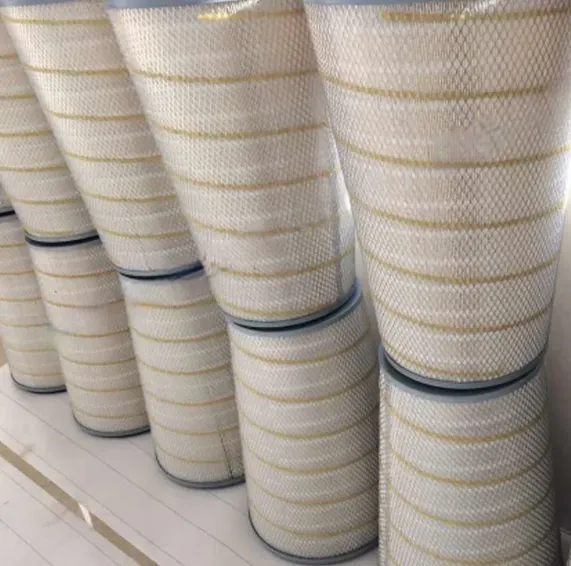 Tel:
+8615930870079
Tel:
+8615930870079
mart. . 14, 2025 09:44 Înapoi la listă
Enhancing Gas Turbine Efficiency: The Essential Role of Gas Turbine Filters in Performance, Emissions Reduction, And System Longevity
Gas turbines are at the core of power generation and industrial applications that demand high efficiency and reliability. A key component in maintaining these turbines' performance is the gas turbine filter, which plays a pivotal role in protecting the turbine from harmful contaminants. As industries increasingly prioritize environmental sustainability and operational excellence, understanding the performance of gas turbine filters, their role in emissions reduction, and the effects of filter clogging is crucial. This article outlines these critical aspects and why choosing the right gas turbine air intake filter can make all the difference.

Evaluating the Performance of Gas Turbine Filters
The performance of a gas turbine filter is vital for the overall efficiency and longevity of the turbine system. To evaluate the effectiveness of the filter, several performance metrics must be considered. These include filtration efficiency, pressure drop, and durability under operating conditions.
Filtration efficiency refers to the filter’s ability to remove particulate contaminants from the incoming air before it enters the turbine. A higher filtration efficiency results in fewer contaminants entering the system, preventing wear and damage to critical turbine components. The gas turbine air intake filter is typically evaluated by its particulate removal rate, ensuring it meets the required standards for particle size and concentration.
Another important metric is the pressure drop across the filter, which affects the airflow into the turbine. If the pressure drop is too high, it can lead to a decrease in the turbine's performance, as the system must work harder to process the air. Conversely, a filter with a low-pressure drop will ensure optimal airflow, enhancing turbine efficiency.
Durability is equally important, especially considering the extreme operational conditions gas turbines often face. A gas turbine filter should be capable of withstanding high temperatures, vibrations, and corrosive environments without compromising performance. This is why working with trusted gas turbine filter manufacturers is crucial to ensure that the filter is constructed from materials designed to last in such demanding conditions.
The Role of Gas Turbine Filter in Reducing Emissions
As industries worldwide strive to meet increasingly stringent environmental regulations, reducing emissions is a top priority. Gas turbine filters play a significant role in this process by preventing harmful particles and contaminants from entering the turbine. By effectively capturing particulate matter, the filter ensures that these contaminants do not contribute to higher emissions, such as nitrogen oxides (NOx) or carbon monoxide (CO), which are common byproducts of turbine combustion.
The gas turbine air intake filter works as the first line of defense, trapping pollutants such as dust, dirt, and other airborne particles that can trigger excessive wear in the turbine. By preventing these particles from entering the combustion chamber, the filter helps maintain optimal combustion efficiency and reduces the likelihood of incomplete combustion. This, in turn, reduces the formation of NOx and CO, contributing to lower emissions and helping businesses comply with environmental standards.
Furthermore, a clean gas turbine filter ensures that the turbine operates at maximum efficiency, which indirectly helps reduce fuel consumption and lowers greenhouse gas emissions. The cleaner the air entering the turbine, the more efficient the combustion process becomes, making the turbine’s operation both more cost-effective and eco-friendly.
The Impact of Gas Turbine Filter Clogging on Turbine Performance
Over time, gas turbine filters accumulate dust and particulate matter, which can lead to clogging if not properly maintained. Clogged filters have a detrimental effect on turbine performance, as they restrict airflow and increase the pressure drop across the system. This can cause a variety of operational issues, including reduced turbine efficiency, increased fuel consumption, and even potential damage to the turbine itself.
A clogged gas turbine air intake filter increases the likelihood of contaminants bypassing the filter, which can lead to internal turbine damage. The additional strain placed on the turbine to compensate for reduced airflow may lead to overheating or premature wear of key components such as blades and seals. In the worst-case scenario, it can result in catastrophic failure, leading to costly repairs and extended downtime.
Regular maintenance and timely filter replacement are essential to avoid the negative impacts of clogging. Gas turbine filter manufacturers often provide maintenance schedules and guidelines to help operators understand the ideal time for filter cleaning or replacement. By adhering to these recommendations, turbine operators can prevent performance degradation, minimize the risk of damage, and ensure the long-term efficiency of the turbine.
Why Choose High-Quality Gas Turbine Filter Solutions?
Choosing the right gas turbine filter is essential to maintaining the performance and efficiency of your turbine while also meeting environmental standards. A high-quality gas turbine air intake filter offers superior filtration efficiency, durability, and minimal pressure drop, which together maximize turbine performance. Filters that are designed with advanced materials and engineered for harsh conditions will ensure that the turbine operates at peak efficiency, reduces maintenance costs, and contributes to sustainability goals by minimizing emissions.
Working with reputable gas turbine filter manufacturers guarantees that the filters you install are designed to withstand the most demanding operational environments, ensuring a longer lifespan for both the filter and the turbine. By investing in premium filters, you not only protect your turbine from contaminants but also help your business stay competitive and compliant with evolving environmental regulations.
In conclusion, maintaining the performance of your gas turbine starts with selecting the right gas turbine filter. Regular inspection, proper maintenance, and understanding the critical role the filter plays in reducing emissions and ensuring optimal performance will allow your turbine to operate smoothly and efficiently for years to come.
-
Types and Applications of Air Filtration CartridgesȘtiriJul.28,2025
-
The Role of Gas Turbine FiltersȘtiriJul.28,2025
-
Mastering Air Filter Cartridge UseȘtiriJul.28,2025
-
Advanced Turbine Filters for Modern Gas TurbinesȘtiriJul.28,2025
-
Cellulose Air Filter Cartridge Advantages in Dust FiltrationȘtiriJul.28,2025
-
Cellulose Filters for Air Particle ReductionȘtiriJul.28,2025

 E-mail:
E-mail:





